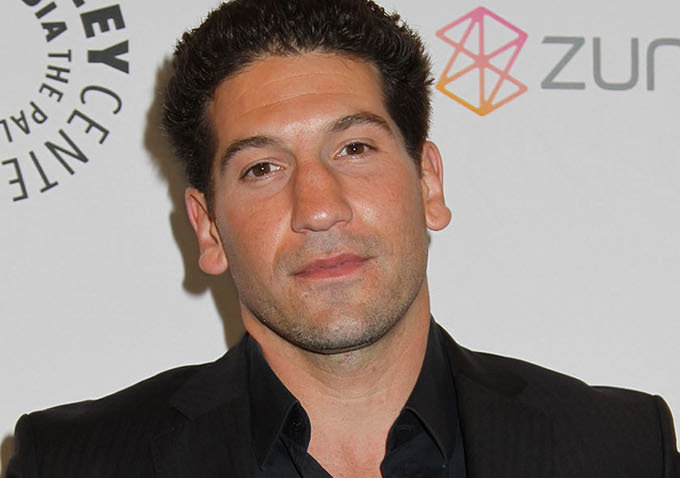Jon Bernthal is a very busy man. In 2017 alone he’s got seven projects listed and you’d be hard pressed not to catch at least one of them, with Pilgrimage just hitting the shelves, Baby Driver currently across cinema screens, and the rather exciting prospect of The Punisher series hitting Netflix in November.
In Pilgrimage Bernthal plays a mute, channelling his performance through an unspoken relationship with a young, naïve monk (Tom Holland) which gives the film its heart and drive, as they set off as part of a group to try and remove a sacred relic from harms’ way. The film is, for the most part, a tense game of cat and mouse with various threats closing in on them from all sides (including an especially nasty one in the shape of Richard Armitage, who we also spoke to recently), but inevitably explodes into blood curdling violence, orchestrated with aplomb by Bernthal’s mute.
Indeed, having recently watched The Accountant alongside Pilgrimage and with his portrayal of Frank Castle still fresh in the mind, it’s noticeable how deftly he’s able to blend tenderness with brutality, adding depth to characters that could otherwise feel one dimensional – physically his transformative abilities make him feel quite unique, especially in the realm of action film and television.
As someone who spends most of my year writing about all things The Walking Dead and who will always champion Mr Bernthal’s Shane, I have to confess (as I did during the interview) that it’s his take on Frank Castle that’s something really quite special. As a fan of The Punisher in all his incarnations, regardless of the faults they might have, it’s made his new Netflix portrayal really stand out, especially when surrounded by an already superb show in Daredevil.
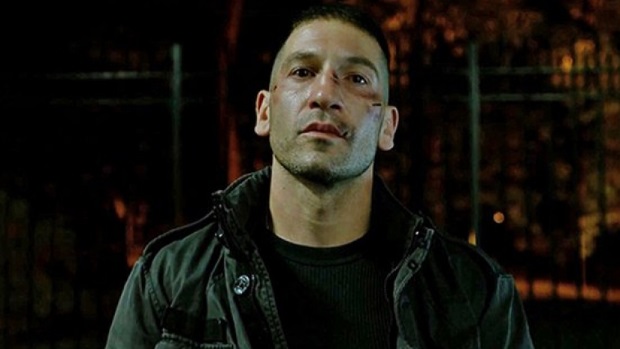
From the beautifully wordless moment of despair when Castle has ‘no choice’ but to kill the filthy pawn shop owner, to heart breaking exchanges with Karen, to the incredible prison brawl, there’s not a beat missed in owning the character.
So with that in mind, we caught up with Jon Bernthal to discuss Pilgrimage, The Punisher and the violent worlds they inhabit…
Back when I spoke to you a few years ago, you had a load of films and TV roles all hitting at the same time (Mob City, The Wolf Of Wall Street, Grudge Match) and it seems like your productivity hasn’t slowed down, so how was it that Pilgrimage managed to get your attention?
You know with Pilgrimage I had been talking to the company here in the States, XYZ, we were talking about finding something to do together and they had something very specific in mind and they had given me a few of scripts of things that they were making, just so I could get an idea of the kind of films that they were a part of and I read Pilgrimage and I just said “I know you guys aren’t talking to me about this one, but if there’s any way I can be a part of it, I would be thrilled!” [laughs]
The script really blew me away, I think Jamie (Hannigan) is one of the great writers working today and in that script it was so unbelievably, beautifully laid out, but one of the things that fascinated me the most was just the use of language, I think there’s seven different languages in the script and then you have this other language, which is that of the mute.
Playing a character without any lines, it would mean you have to develop your own language and especially to develop a language between myself and Tom Holland, because those characters are so close. I just thought that the challenge of playing a character who wasn’t able to use his voice, but would have to communicate so much to the audience and to the other characters would be really interesting.
I was having a discussion in another interview recently about the culture of dubbing vs subtitling, and one of the things I admired about Pilgrimage was its bravery in using so many languages combined with subtitles, because in some ways it means you have to engage and involve yourself more with it.
Well you have to engage and I think that Brendan (Muldowney, the director) and the marriage with that script – and Brendan’s last feature, Savage – I thought would make a really good marriage because as much as Jamie’s film is very lofty and well researched and I think extremely truthful to the time, I think all the different languages contribute to this atmosphere of wildness and unknowingness and how on the fringe society would have been after the crusades, with all these different fighters from all these different lands sort of coming together and I really appreciated that.
But at the same time I saw Brendan’s way that he uses violence in films and I thought this is a film that is really not just an art piece, I think the idea here was to make it somewhat of an action film as well and I loved the idea of making it a thinking man’s action piece and I loved the idea of, like you said, it challenges the audience to stay engaged, to learn something, to use their minds, but then also to have there be this real action component and it was important to me that the action was rooted in something very emotional and very honest and was all character based and I really felt it was that way in the script.
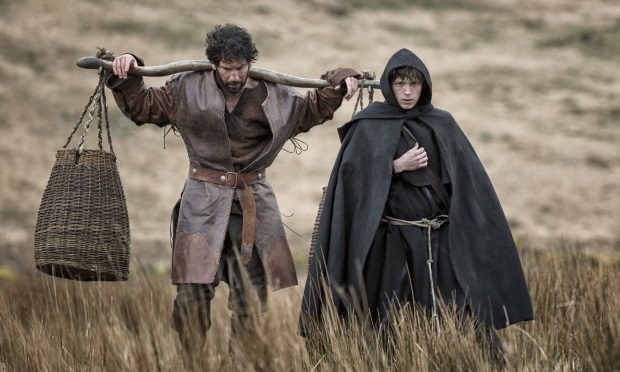
I wondered, because of the level of research in the script, how much of a backstory for your character you were given, or were you free to research him and add your own layers?
A little of both, I mean I definitely talked to Jamie a bunch about what his ideas were and he gave me this great piece of historical fiction, called The Crusader, and I read that book and it’s all about two best friends from Spain who went off to fight in the crusades and the toll that it took on them and the effect it had on them when they came back.
I did develop my own intricate backstory and really became as familiar as I possibly could with the horrors of the fourth crusade and the toll that it took on people and then really kind of dive in with Tom Holland about what that relationship was and when this mute, when he washes up on these shores – what were these last five years like? What was living in this solitude and this silence – what effect did it have on this man and how is he finding what he’s now looking for, you know how does he live a life that he feels like he deserves and how can he potentially fit in with this society?
And I think that he found a real quiet and a real peace within this group of monks and obviously following the events of this film, when that gets challenged and changed, that he’s forced to commit violence again and act and I find that very interesting. I think that the film has a lot to say about violence in the name of religion, violence because other people fund religion, or from other parts of state are telling you to commit violence and how that’s different from the violence that a man may engage in when the people that he loves are starting to be effected – and I think those are very different things.
I think those are three different levels of violence and you might have sworn off two, but the third will always be able to get you.
Absolutely, like a breaking point. And one of my readings from your character was that there was more honour in his silence, because most of the words spoken by the other characters in the film were self-serving and deceitful – was that something you thought too?
You know I’ve said before that one of the real questions of how to go about playing this character – I tried to take a sort of vow of silence myself, when I got to Ireland I spent the first ten days or two weeks completely silent, off set and on – and I later discovered that this way getting in the way of the film – but in the beginning I thought that it was very crucial to understand this character and I really did see in remaining silent, how much more you see and listen and how much of the things that come out of people’s mouths are completely unnecessary and I guess that is one word for it, self-serving.
I think that once you start to be silent, you start to divorce yourself from your wants and needs – if you want something from someone you have to ask for it one way or the other, whether you’re being straight up, or doing it in a roundabout away. And I think what I really discovered about being silent for that amount of time was that you have the instinct of ‘oh I want this’ or ‘I want this to go down this way’ or ‘I want this thing from this person’, but then you have think ‘well I’m being silent, I’m not talking’ and then the next logical question that pops into my mind is ‘do I really need this and do I really deserve this?’ and I think if you’re talking about a character who’s taken a vow of silence – it’s not a medical silence, it’s not that he’s not able to speak – he’s just taken a vow and he’s done that because of the horror of his actions and that was kernel for me of where I could really find that character, in that – do I deserve these things? And the answer is that he feels like he doesn’t and that’s why he remains silent.
So that was really interesting to me and the most valid part of that little experiment.
Over the years you’ve played a variety of characters that have had military, or gun training, but in Pilgrimage it’s an ancient form of combat, so how did the challenge differ?
I was able to train with a great swordsman here and when I got over there Paul Burke was the fight co-ordinator and I can’t say enough good about him and his team. Look, we didn’t have a lot of money to make this movie and those action scenes were each shot in half a day, so it meant that we were really racing the sun in both of the big sword action scenes. So it did definitely require a lot of rehearsal and you know you can’t depend on the elements working in your favour and when working on an independent film the one thing we needed to know was the fight as well as possible and I just can’t say enough about how talented, skilled and kind that group of stunt performers were.
As do more and more action heavy movies and television, I just can’t say enough good about stunt people in general. I think they’re the real unsung heroes of this business and for decades they’ve made actors like myself look good and I was really grateful to be able to do everything myself and just because I’m the one in there doing it, but all that means is that I was trained really well and that it’s an unbelievably good group of people around me and I was really grateful for that.
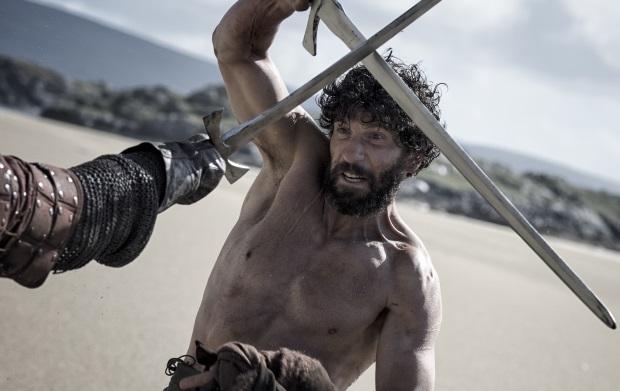
And am I right in saying that it was when you were filming Pilgrimage that you submitted your audition to play The Punisher?
Yeah and you know because of where we were, in a very remote part of western Ireland – and because of this vow of silence I was taking, it was quite hard for me to communicate with my agency back home! [laughs] But I did get word that they were interested in me for Frank Castle, so they said they wanted me to make a tape and I think we were shooting the last two weeks of the film and we were in Belgium and we made a tape in a park, me and Tom Holland and Stanley Weber and it was lot of fun!
The last time I spoke to you was a few years back, for Mob City, which I’m gutted was cancelled, but the great serendipity to come out of that was getting to play Frank Castle, because – if you’ll indulge me for a minute – I think Daredevil is brilliant and your performance when you came in to season two was just outstanding…
Thanks, man.
It’s often difficult to enthuse about something too much, while still sounding professional!
It’s all good, mate!
So how much expectation did you put on your own shoulders when you were cast?
It was incredibly humbling to get that job. I agree, like you, I was a fan – and you know I wasn’t familiar with Daredevil, but I became familiar with it quickly. I was enormously impressed and was blown away by D’Onofrio and Deborah and Charlie Cox. I’d never been in that position before, going onto a show that was really working – with Walking Dead I’d started at the beginning and was part of the team from the beginning – but to go on to something that was really working, there was this pressure that you don’t want to be the one that screws it up, you don’t want to be the weak link! [laughs]
But beyond that, because I do have some familiarity with the comic book audience from Walking Dead, I know how much Frank Castle means to so many people and it’s a responsibility that I take enormously… it’s huge for me and I know how much the character resonates with members of law enforcement, members of the military and it was something that I really, really wanted.
And I had also known that there was a stigma to the role and people question some of the previous iterations. I got really lucky to get this part and I got really lucky to be able to tell Frank’s story over a thirteen episode arc and now that we’ve shot season one of The Punisher series, I’m just very nervous, I really just hope people like it. You know we’ve worked really hard and I really, really want people to continue to dig this version of Frank and I care about his audience deeply.
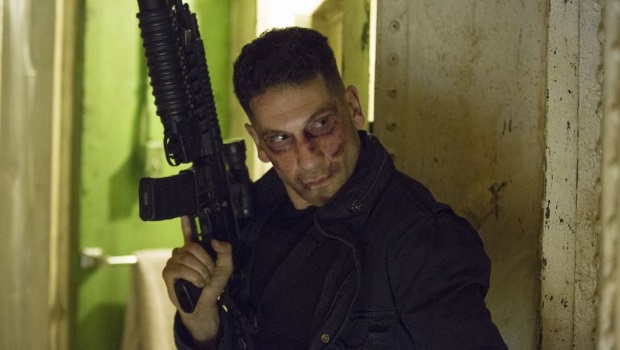
It was great, like you say, to get such an extended amount of time to develop the character of Frank in Daredevil, because there’s so much complexity to him and too often I think he’s thought of as just an avenging angel and his depth isn’t appreciated.
It’s interesting that you mention the other iterations of The Punisher, because they all had their time and I confess that I thought the Dolph Lundgren version was the best thing ever when I was a teenage boy, but being a father of a young son, my sensitivity and relationship with the character has developed now I’m a parent – so have you drawn from your own experience of being a parent to help you find an extra level of empathy in your performance?
Yeah, look man, one hundred percent and I think it ties into Pilgrimage as well, I think number one – and when I say previous iterations, personally and it’s not even that you’re the press, I really dig the previous iterations. I think people have the issues with them, but again I think the thirteen episodes and the Netflix model of telling a story means you’re really at a huge advantage as you get thirteen hours of material.
In my opinion, I would never be able to play Frank Castle if I wasn’t a husband and a father, if I didn’t really understand what it meant to love something and have a love for someone else that’s far greater than a love for myself and happily, willingly would give my life for these people in a heartbeat. And just like I was saying with the mute in Pilgrimage too, you’ve got to find the kernel of the character, you’ve got to let your imagination – which is the way I like to work, I like to find ‘what does it all come back to’ and for me, to understand what this love is – there’s nothing I understand better now that my love for my wife and my children and for that to be taken away and for someone to have taken that away from me? That is a line that scares the shit out of me, but it’s something I understand and I empathise with deeply.
And I think, like in Pilgrimage, if you were sent to war to go fight in the name of religion, or if you’re sent to war to fight in the name of country, or in the name of your superior officer, those are all one thing, but if you’re being asked to fight because someone is attacking the people you love, that’s a whole different thing and it’s something where the type of violence and where it comes from, is from a completely different place and trying to pinpoint that and trying to make that as specific and detailed as possible is something I’m very, very interested in. I’m not really interested in making sort of a one-note barbarian in any of these characters and if people take that from it, then I feel like I’ve really failed.
So I think in both of these characters, I think there’s that – I think exploring and understanding that, but to answer your question, yeah I mean the reason why this character resonate so much with me first and foremost is because I’m a husband and a father.
For my last question, where you were referencing the difference of starting a show, as opposed to coming into Daredevil when it was already established – where I’ve interviewed quite a lot of your friends and colleagues from The Walking Dead over the years, especially Sarah Wayne Callies and Andrew Lincoln, that when the series was first starting it was difficult because no one knew what to expect from it and there was a certain cynicism from outside about how it could succeed – is that a challenge that you remember too?
Absolutely, I mean there’s a reason why Andrew Lincoln and Sarah Wayne Callies and Steven Yuen and Melissa McBride and Norman Reedus, that we all consider each other best friends and family. When we started that thing it started in an unbelievably humble place, you know we had no idea what that show was going to become. All we knew was there was a script we really believed in, there was a showrunner we really believed in and we got to know and love each other intimately and believed in each other and we had no idea whether it would be a success, or a failure and we really didn’t care, we just believed in it.
It’s interesting, it was probably the most innocent and rewarding experience that I’ve ever had, I was surrounded by a cast and a crew and a writer – everybody was making a show for one hundred percent, totally the right reasons, everybody just believed in the material and everybody willingly gave everything that they had for it. The only way I can sort of answer the question is, there is a reason why I’m bonded to those people, unlike any group of artists I’ve ever been bonded to and we’ll be bonded forever.
I’ve learned a lot of lessons from Walking Dead I think, you see what happens in success, you see how both things change and see how some things stay the same and it’s taught me a lot. I’ve said before I’m enormously grateful to have been a part of that show and I’m enormously grateful for leaving the show when I did and being able to be a part of the things I was able to do and I think, as far as Daredevil’s concerned, I think because of Walking Dead I went into Daredevil with an immense amount of respect for that cast and that group, because I knew they had established something. I was walking into their home, I was walking onto their turf and it’s a lot different from being the guy who built the house, it’s just a different thing and I think it’s something to consider.
Jon Bernthal, thank you very much for your time and as you might have gathered, I can’t wait for season one of The Punisher!
Aww man, I really hope you like it – we’ll talk then, I really hope you dig it!
Pilgrimage is out now on Blu-ray, DVD and Digital Download.

